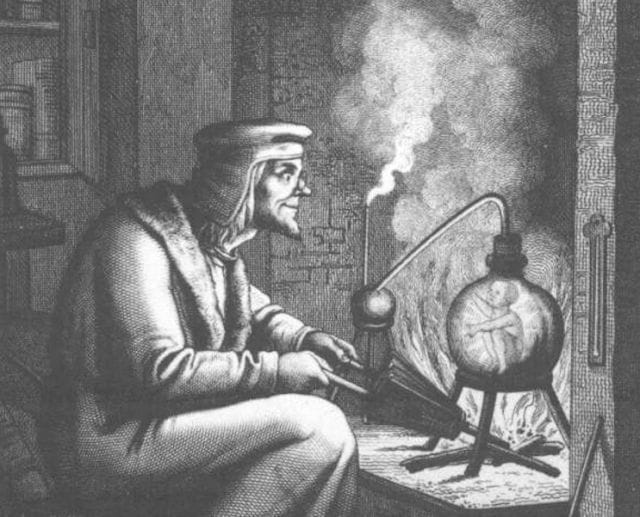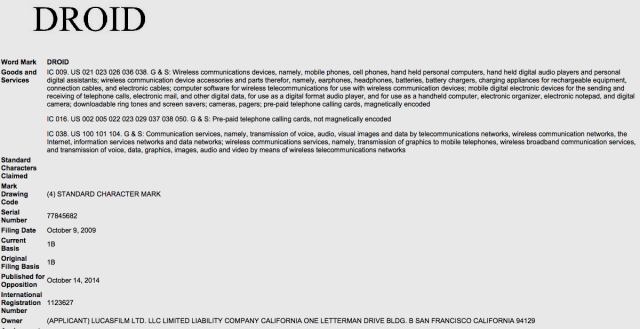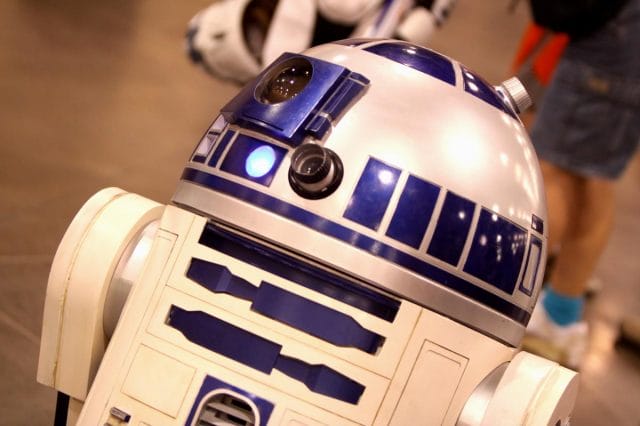Ben Obi-Wan Kenobi: These aren’t the droids you’re looking for.
Stormtrooper: These aren’t the droids we’re looking for.
— Star Wars Episdoe IV: A New Hope (1977)
![]()
“Droid” is a pretty popular word these days.
It’s the name brand of a variety of popular smart phones produced by Verizon. It graces the pages of hundreds of science fiction novels and appears in countless films. It is used to describe a wide array of robots, both human-like and and not-so-human-like. And in every instance of its use, Lucasfilm either makes money, or takes legal action.
That’s because technically, George Lucas invented the word in 1977 — and some 30 years later, just before Verizon rejuvenated “Droid”, Lucas trademarked it. For some companies, this has come with financial and/or time-consuming repercussions.
What’s in a Droid?

A 19th century engraving from Goethe’s Faust part II, picturing a man creating an “Androides” (a little man) with alchemy
While George Lucas technically coined the word “droid” in 1977’s Star Wars, it is merely a bastardized form of “android”, which can be traced back nearly 300 years.
“Android” first appeared as the word “Androides” deep in the pages of Ephraim Chambers’ Cyclopædia, an English dictionary of mechanical and scientific terms, in 1728. Originally, it was used to refer to the efforts by alchemists to create a homunculus, or a “miniature, fully formed human” — specifically those efforts by St. Albertus Magnus, a Catholic saint who lived in the 12th century Holy Roman Empire.
By the mid-19th century, the term began to assume its modern definition as a robot with human-like qualities. In his 1886 science fiction novel, L’Ève future (Tomorrow’s Eve), French author Auguste Villiers de l’Isle-Adam tells the story of a fictionalized Thomas Edison who builds an “android” version of his friend’s wife — “without the bothersome traits.” Retaining this meaning, the term gradually made its way to the United States, as evidenced by a series of patents for mechanized, humanoid “Doll Androides” filed by toy-makers.
As a term, “Android” made thousands of appearances in science fiction works throughout the 20th century. In Edward Hamilton’s Captain Future (1940), a distinction was made between robots (mechanical beings not resembling humans), and androids (mechanical beings resembling humans). Philip K. Dick most famously employed the term in his series of android-related fiction throughout the late 1960s and early 1970s, also agreeing that androids were generally “human” in appearance.
In 1977, at the height of the term’s popular usage, George Lucas shortened it to “droid” — used to refer C-3P0, R2D2, and other automatons in Star Wars — and laid claim to the word. Today, a “droid” refers to “any robot, including distinctly non-human form machines.”
And today, LucasFilm owns the trademark on the word.
All Your Droid Are Belong to Us

Lucasfilm’s “droid” trademark, filed with the United States Patent and Trademark Office
In September 2008 — nearly 31 years after the premier of Star Wars — George Lucas’ parent company, Lucasfilm, trademarked the word “droid”. The filing, shown above, was granted in May of 2009, and claimed exclusive use of the term for the following applications:
“Wireless communications devices, including, mobile phones, cell phones, hand-held devices and personal digital assistants, accessories and parts therefor, and related computer software and wireless telecommunications programs; mobile digital electronic devices for the sending and receiving of telephone calls, electronic mail, and other digital data, for use as a digital format audio player, and for use as a handheld computer, electronic organizer, electronic notepad, and digital camera; downloadable ringtones and screensavers; cameras, pagers & calling cards.”
Lucas’ filing was timely, and likely synchronized: a few months later, in October of 2009, Verizon released its Droid line of phones (HTC and Motorola). In the first week, Verizon sold an estimated 250,000 Droid phones; by 2.5 months, they’d sold 1.05 million. All the while, Lucasfilm received a handsome chunk of change from Verizon for lending their Droid trademark.
To keep a trademark active, one must vigorously defend it, sometimes excessively; this is exactly what Lucasfilm has done. Since 2009, they’ve taken legal action against a number of companies that have employed any variation of “Droid.” Among them: a small Los Angeles-based video ad banner start-up called Addroid.
“We make ad banners and the platform is a way to build and deploy them in a very automated way,” the company’s CEO, Matt “Coop” Cooper tells us. “That automation is why we called it ‘Addroid’. It’s like a robot.”
Cooper recalls the struggle of branding his company in July of 2010, just before its launch. “I’m trying the think of a name,” he recalls. “It’s like a robot that makes ads…an adrobot? No. Adbot? Nah. Then it hit me — Addroid!” Unfortunately for Cooper, who refers to his company as the “Krispy Kreme of ad tech,” Lucasfilm’s lawyers were none too pleased with his unwitting integration of the word “Droid”.
“Honestly man, I wasn’t even thinking of the Star Wars thing,” he pleads. “I was just trying to make up a word and get a domain I could afford that wasn’t going to cost me $60,000.”
A few weeks later, in August of 2010, Cooper received an ominous gift in the mail from Lucasfilm — a cease and desist letter that demanded he immediately change his company’s name, or face legal action:
The cease and desist letter sent to Addroid by Lucasfilm (Scribd)
In the letter, Lucasfilm’s lawyers argued that Cooper’s use of “Addroid” would “dilute [Lucasfilm’s] famous DROID marks, resulting in their loss of fame and distinctiveness.”
Cooper was not convinced.
“I wrote back and said, ‘Dude, my only intention is to use this strictly for digital advertising,’” he recalls. “I sat down with my lawyer and wrote down every single word ever associated with digital advertising on piece of paper, then said, ‘This is the full scope of what I want to use these five letters for.”
Ultimately, the cease and desist letter was an effort on Lucasfilm’s part to avoid consumer confusion — the possibility that a Star Wars fan would stumble across Cooper’s domain and believe that he was in some sort of Lucas-related portal. But Cooper insisted that his company was not consumer-facing, nor had any intention to dupe people into purchasing Star Wars paraphernalia.
“My average customer is not going to be buying a $9 plastic lightsaber from me,” he retorted. “The idea that your Star Wars customers are going to get confused and are going to stumble upon my site, build a banner, and deploy it is ridiculous.”
The plea worked. Lucasfilm’s lawyers responded, offering a compromise: Cooper signed a “little piece of paper” agreeing not to make a video game, or anything else consumer-facing, and in return, he didn’t have to rename his company.
In retrospect, Cooper considers himself lucky. After all, he not only escaped the legal threats of Lucasfilm, but also those of tech behemoth Google, which has owned the trademark to the word “Android” since 2007, a few years after purchasing Palo Alto-based Android Inc. “Google probably would’ve had a case against me,” admits Cooper, “but I was lucky.” At the time, Google was embroiled in another trademark lawsuit: a Texan named Eric Specht, who had previously owned the Android trademark but lost it due to inactivity, had brought the company to court over its use. Specht eventually lost.
It is this very inactivity that Lucasfilms has tried to avoid, reiterates Cooper. “If you’re a hammer, everything looks like a nail,” he says. “If you’re George Lucas’ lawyer, you’re like, ‘Dude, I don’t care what’s in front of droid in your brand name. You can say whatever the hell you want, but that’s mine. I own those 5 letters.’”
![]()
Fun Fact: Today, there’s another twist to Lucasfilm’s trademark of “Droid”: In 2012, Disney purchased Lucasfilm. The Steven P. Jobs Trust is Disney’s largest shareholder, with a 7.7% stock. Since Lucasfilm (now Disney) owns the rights to the word “Droid”, Steve Jobs is posthumously profiting from the sale of every Motorola Droid phone — one of the Apple iPhone’s biggest competitors.
This post was written by Zachary Crockett. You can follow him on Twitter here.
To get occasional notifications when we write blog posts, please sign up for our email list.




